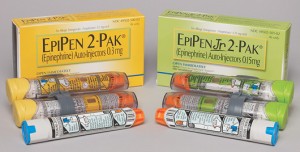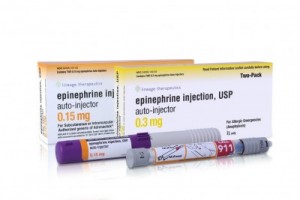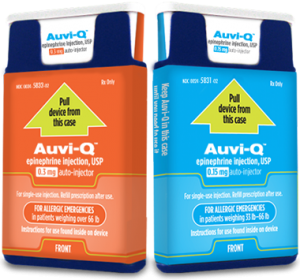There will be 3 epinephrine autoinjectors on the market effective February 14, 2017: the EpiPen, Adrenaclick and the Auvi-Q. All three devices are available in a Junior strength for children, and an adult strength.
Listed below are the pros and cons of each of these devices based upon my experience and upon the information available on their websites:
The EpiPen has been around since 1977, and owned by Mylan since 2007. There has only been one recall that I’m aware of, which was in 1998 when Meridian Medical Technologies manufactured the device. Almost 1 million devices were recalled since they weren’t providing effective doses of the medication.
The EpiPen training video states that the device needs to be held for 3 seconds after administration.
Pros:
- The EpiPen currently has the largest share of the market, which means that more people have been trained on this device than any other.
- A trainer comes with every prescription.
- The used EpiPen has the needle protected with the orange cap.
Cons:
- The price! Currently the brand name 2-Pak is around $600+ without a coupon. The generic EpiPen will cost you $300, and no coupon is available.
- With a generic EpiPen available, and the Adrenaclick (generic epinephrine), your insurance company may not cover the brand name drug.
- The size. Carrying a 2-Pak is bulky, and many young men really balk at this.
- The short lifespan. Generally the EpiPen expires within 12-14 months, and you’ll likely have to ask the pharmacist for the furthest out expiration date to get this.
Adrenaclick manufactured by Amedra Pharmaceuticals
The Adrenaclick has been on the market since mid-2013. The training video states that it needs to be held for 10 seconds after administration.
Pros:
- The cost at CVS pharmacies. With a $100 coupon, the cash price is $9.99.
- The lifespan. Adrenaclick’s have an expiration date at least 24 months out.
- Less bulky than the EpiPen.
Cons:
- No trainer comes with the package. You will need to contact the company and request to have a trainer sent to you. You can do so here.
- Fewer people have been trained on the Adrenaclick in school systems and elsewhere. This may change as more people purchase the device and bring it to school, etc.
- The cost at approximately $400 with high deductible policies if you don’t purchase the device at CVS.
- The needle is exposed after use.
- You need to pull both tabs off of both ends of the device before administering it. This can make for confusion as to which end to use for injection, even though it has a red tip. Seconds count in an emergency, and a layperson may have more difficulty with this.
Auvi-Q manufactured by Kaleo Pharmaceuticals
The Auvi-Q was originally manufactured by Sanofi, and was introduced in January of 2013. A recall of all devices occurred in October of 2015 when two dozen of the devices were suspected to have not administered the correct amount of medication. Sanofi no longer manufactures Auvi-Q. Instead Eric and Evan Edwards, the inventors of the Auvi-Q, brought the manufacturing back to their company, Kaleo Pharmaceuticals. Both Eric and Evan, and their children, have life threatening food allergies.
The Auvi-Q training video states that the device needs to be held for 5 seconds after use.
Pros:
- The device can talk anyone through the administration of epinephrine.
- A trainer comes with a prescription.
- Size. It’s about the size of a thick credit card, which makes it easy to carry in a front pocket for men.
- Cost. Kaleo is promising $0 out of pocket cost, even for those with high deductible insurance!!
- The needle is not exposed after use.
- The makers of Auvi-Q have food allergies themselves, as do their children. In other words, they are one of us – the food allergy community AND they have a social conscience when it comes to pricing autoinjectors.
Cons:
- The previous recall may be on some people’s minds; however, with the manufacturing moved in-house, I believe this issue has been resolved.
- The lifespan of at least 12 months. But if you’re paying $0, I don’t believe that’s as big of an issue!


